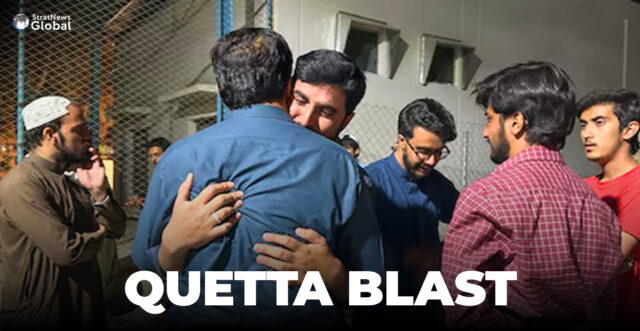A bomb explosion claimed the lives of at least 11 people during a public rally in Quetta, southwestern Pakistan, late on Tuesday, officials said.
Government official Hamza Shafaat said the rally was held to commemorate the anniversary of the death of Sardar Ataullah Mengal, a nationalist leader and former provincial chief minister.
His son Sardar Akhtar Mengal, who was in attendance, is safe, Shafaat said, adding that another 30 people were injured.
“The reports we have say that the bomb went off in a parking area as the people were leaving the rally,” he said.
Police were investigating the blast, which appeared to be a suicide bombing, police official Athar Rasheed said.
No one has claimed responsibility.
Quetta is the capital of restive Balochistan province, which borders Afghanistan and Iran.
Both Islamist militants and Baloch separatist insurgents operate in the region.
Since 2014, China has poured substantial resources into developing a major road and infrastructure network in Balochistan, as part of its broader One Belt One Road initiative.
Yet, many Baloch residents argue that the advantages of these projects have been monopolised by outsiders rather than benefiting the local population.
Rising Attacks In Balochistan
For more than ten years, Pakistani security forces have been locked in a persistent struggle against a violent insurgency in the province. The year 2024 witnessed a particularly sharp escalation, with 782 fatalities recorded in Balochistan alone.
On Tuesday, violence again flared elsewhere in the province when a homemade explosive device struck a paramilitary convoy near the Iranian border, leaving five personnel dead and another four injured, according to a senior local administrator.
Since the beginning of 2025, armed groups waging war against the state in Balochistan and neighbouring Khyber Pakhtunkhwa have killed more than 430 people, the majority of them members of the security services.
The same day, the military reported that six soldiers were killed in Khyber Pakhtunkhwa’s city of Bannu, following a major assault on a paramilitary headquarters.
A government source said on condition of anonymity, “a suicide bomber rammed a vehicle packed with explosives into the entrance of the FC camp, after which five additional suicide attackers forced their way inside.”
The firefight that followed raged for nearly 12 hours before concluding with the deaths of all six assailants, the official confirmed.
Responsibility for the Bannu attack was later claimed by the militant faction Ittehad-ul-Mujahideen Pakistan.
(With inputs from Reuters and IBNS)





